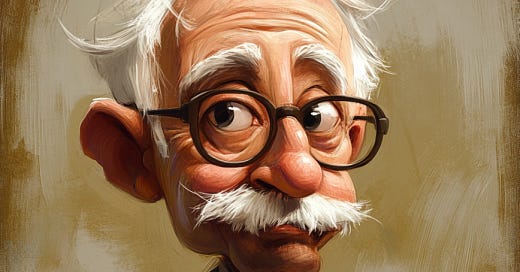“I’ll never sit for a caricature artist.”
My pastor recently said this; I’ve always thought it for myself.
Caricature artists blow up your least appealing features. I’m too sensitive for that. If an artist ever got their pencil on me, they’d focus on the absence of hair on my head and the abundance of it on my face. Sticks and stones will break my bones — caricatures will shatter them.
Warning: I’m going to challenge both political sides, so please hold onto any conclusions before reading the entire post. I’m biased, of course, but I’m doing my best to be fair and honest. I’ve never been loyal to a party. In my opinion, both sides have some good intentions and damaging tendencies. I’ve also never been passionate or super knowledgeable about politics. So take my words with a grain of salt. I’m just sharing a single perspective with some steps we can take to move forward together.
We’re in a caricature culture.
I’m afraid we’ve blown up features of those across our political lines to where we see people as cartoons rather than humans. And it’s a lot easier to hate a tribe you manufacture than a people you know.
The results of Election Day prove what happens when a people group gets tired of being treated like a cartoon. You can’t explain away the red by saying all 75M Republican voters are racist, sexist, and transphobic. And the blue is not God-hating people looking to take your babies and guns. Those are lazy caricatures. If we try to make sense of this election by only using caricatures, then the country will be more divided in four years.
The second-best caricature artist: elite Democrats
I enjoy SNL, but it was exhausting seeing how they grabbed at the low-hanging fruit of Trump and squeezed it dry. But it wasn’t just late-night comedy shows. I read NYT more than any other news source, but I was tired of seeing Trump on their homepage more than anything else. The core message I heard from Democrats was, “Hey, we’re not that crazy guy.” It’s a strategy driven by caricatures. The people who loved that strategy the most were the elite — particularly the white, wealthy, and well-educated. But it left most of America wanting more.

I believe a driving reason the Democrats fell short is because they’ve lost their ability to speak to the ordinary American. The average person is put off by the virtue signaling of the affluent. And the policy has become fuzzy, with Kamala failing to bring clarity. But this election isn’t on her. It’s on the Democratic Party for losing touch with who they used to be for: the working class.
The Democrats’ ads for the middle class have lost credibility since they’ve become more known for the Hollywood endorsement and Ivy League universities than addressing practical problems for the average American. The shift away from the working class is why the main people group Kamala outperformed Biden was affluent white voters. I never thought Trump would win because nearly everyone but whites moved closer toward him this election cycle. And when there isn’t a clear message of how you can serve the common person, the masses move toward the only other option.
The king of caricature artists: Trump
But, of course, caricature-based communication isn’t just a Left problem. Trump is the Monet of caricature artists. He’s repeatedly drawn pictures of others that incite fear and hatred. He also manufactures features of others that simply aren’t true. Perhaps the most untrue picture he manufactures is the one of himself. He makes a cartoon of those against him while making a savior of himself. Unfortunately, too much of the American church has bought the forgery he’s selling.
I’ve heard too many Christians justify Trump’s actions by saying, “Nobody’s perfect. God uses imperfect people — look at leaders in Scripture like David.” But what separates those biblical characters from Trump is not their levels of imperfection — it’s their repentance. Their willingness to humble themselves. And most importantly, their belief that they serve a God that is not themselves. We’ve yet to see Trump accept responsibility for his wrongdoings. His narcissism scares me, but not as much as his refusal to change.
A cure for caricature artists: curiosity for context
Remember that story of the person who sued McDonalds after dropping their coffee on themselves? They said it was too hot. How ridiculous, I thought. It’s coffee, of course, it’s hot.
Most of us will vaguely remember that story, but that’s all we know about it. We fail to zoom out to see the full story. We fail to ask for context.
It turns out that the person who sued was a 79-year-old woman. The coffee caused third-degree burns on her thighs, groin, and butt, requiring multiple surgeries and skin grafts. She sued for $20K to cover her procedures, but McDonalds only offered $800. Her lawyers then went off and won her an undisclosed amount (probably more than $500K).
Before I learned about the context of the “hot coffee lawsuit” I assumed it was a young diva looking for a quick buck. Now, I have empathy for 79-year-old Stella Liebeck.
Curiosity for more context can squash our caricature art.
Thomas Jefferson is credited with saying, “An educated citizenry is a vital requisite for our survival as a free people.” Many of us, myself included, failed to be curious for more context this election cycle. I don’t blame us entirely for that. It’s hard to keep up with a flood of ever-changing information. It’s even harder to know if political leaders mean what they say. The information treadmill is so exhausting that it’s just easier to run with headlines.
For example, headlines made me think Trump has deported more people than any president. But after asking questions, I was shocked to find that just as many people have been deported under Biden’s presidency (~1.5M). However, Biden and Trump weren’t nearly as strong on immigration as a former president, who immigration advocacy groups call “deporter in chief”.
That would be Obama.
Under Obama’s presidency, more than 3M people were deported. But then again, context is everything.
Obama served eight years to Trump’s four. And while Obama focused on deporting criminals and those at the border, Trump threatens to deport illegal immigrants with no criminal activity and those who have been established inland. Obama’s numbers are higher, but Trump’s methods are more destructive.
Here’s the point: Curiosity for context can turn blanket accusations into fruitful conversations.
The two most sensitive issues of the election (reproductive rights and the border) demand more curiosity.
For instance, rape and a mother’s health can’t be key arguments to advocate for abortion. According to a study from the pro-choice Guttmacher Institute, less than 1% of abortions are because of rape. And about 6% of abortions are performed because of the mother being concerned about her health. Most Republicans, especially Trump, advocate for abortions in these few circumstances. Since 2020, Trump’s moved closer to pro-choice, recently saying he would veto a national abortion ban and be for abortion up to 15 weeks in pregnancy. About 93% of abortions take place at or before 13 weeks. If “saving babies” was the driving force behind your vote for Trump, then I’m afraid you’ll be disappointed. And since his methods are more harmful to women, he seems like a lose-lose in the abortion conversation.
I realize I can’t cover the entire landscape of complex and nuanced topics like immigration and abortion in a few paragraphs. I couldn’t if I tried — I’m a white American man who doesn’t have experience with either of these topics. I know my privilege will always give me some of the biggest blind spots.
All I’m advocating for is that we do the personal work of digging into the caricatures we’ve fallen for to see where we may be missing part of the picture.
I also acknowledge that some readers on both sides will get upset just for attempting to raise some curiosity about sensitive topics. But that’s where my final message comes in: let’s have a meal together.
The most practical step toward each other
Last week I had dinner with a friend who voted differently than me. We weren’t meeting to talk about the election. We were just catching up over burgers. But as the topic came up, we laughed at the realization that we agreed on 95% of things. We were both humbled by how much we didn’t know. And we were encouraged by the common ground we can share when we take the time to be curious.
If I could encourage you and myself to do one thing in response to the election, it would be to have a meal with someone who voted differently than you. Just you and them. Bonus points for listening more than talking.
5 more steps for breaking down caricatures:
Delete social media. An echo chamber is a breeding ground for caricatures.
Stop consuming global news. Yes, it’s important to be aware. But we’ve become aware of so much that it’s more likely to create anxiety than helpful action. Shrink your world to the people, places, and problems around you.
Diversify your inputs. Read, watch, and listen to people who believe differently than you. Ask yourself “What if I’m wrong?”
Name the good in ‘the other.’ I believe both Democrats and Republicans have good ideas that can make our country better. Rather than drawing caricatures by focusing on the flaws of the other side, spend some time naming what you appreciate.
Name what you don’t like on your side. On the flip side, both the Left and Right are imperfect. Name what you don’t love about your political party. If you line up 100% with your party and 0% with the other, then you’re not participating in politics — you’re following a god who will continue to hurt you.
✌️
— Luke
P.S. If you made it this far, thanks.
Thanks for listening to my imperfect thoughts on a situation I feel underqualified to speak on. I realize I can’t address every nook and cranny of a complicated circumstance. Please give me grace where I fell short. I’m a work in progress and you’re vital for that growth. So, I’d love to hear your thoughts on what resonated with you and what I’m missing. My inbox is open — but only to curiosity and kindness.






Staying informed but not obsessed has been key to staying sane. I’m on social media wayyyy less now. I loved this, Luke.
This was great Luke. I enjoyed the Thomas Jefferson quote and the action items you listed. Thanks!